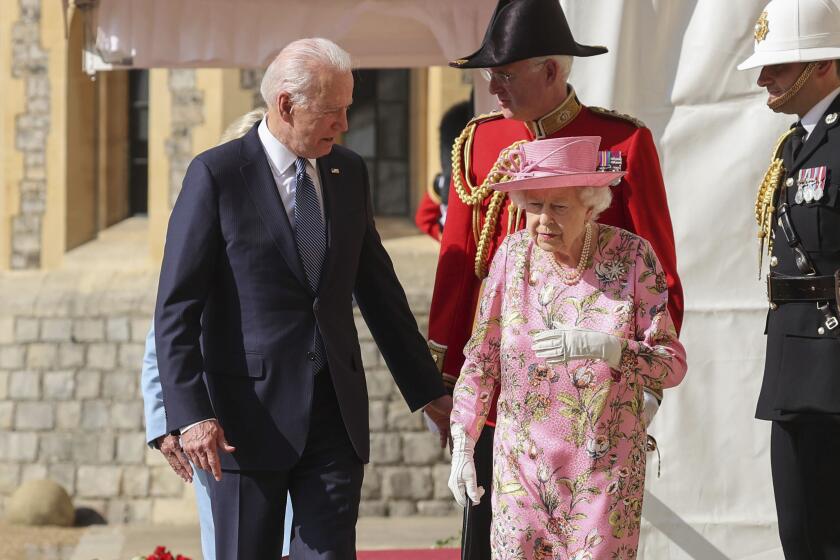Apodaca: Tiger, helicopter or unicorn? Regardless of parenting style, let’s think of the children

- Share via
Remember Tiger Mom?
Vaguely? Well, I don’t blame you if you’re struggling to recall what that nonsense was all about. The Tiger Mom was so 2011, and since then we’ve been through such a vast assortment of nicknames for different parenting styles that it’s hard to keep track.
The tigers were followed by a Noah’s Ark-worth of other animals. There was a lengthy bear phase. At one time or another in the past decade some parents were said to resemble koalas, which hold their offspring close; pandas, which apparently prefer to let the youngsters do their own thing, and fierce, don’t-mess-with-me grizzly parents.
Then we had the nurturing and protective elephant parents, dolphin parents who set firm rules but let their children make their own life choices, and — one of my favorites — jellyfish parents, who are considered even more permissive than those free-wheeling pandas.
Our extensive animal phase has even included some mythical creatures, the most memorable of which is the unicorn parent. The Urban Dictionary defines this as “a mother who’s not perfect, enjoys alcohol, has a sense of humor and couldn’t care less what you think.” She might not care, but I think I like her.
Some designations just seem random. Lighthouse parents supposedly believe in the long game, favoring an approach that involves letting kids make mistakes so they learn from their failures. Velcro parents are so attached to their kids they make those cuddly koalas look positively hands-off, while silky parents are big on science and technology. Then we have so-called crunchy parents, which — actually never mind, I don’t even want to know what they think.
From there we segued into mechanical themes, as in umbrellas, helicopters, snowplows, lawnmowers and bulldozers. We’ve gone from covering to hovering, sweeping to smoothing, and now we’re on to earthmoving equipment. Who knew that parenting involved such intensive manual labor?
The point I’m getting to, in revisiting all these trends, is that the way we think about parenting has gotten out of whack.
There’s nothing inherently wrong with reading books about parenting styles, seeking expert advice or looking for philosophies and methods that sync with someone’s instincts about child-rearing.
Daily Pilot columnist Patrice Apodaca, a self-professed Anglophile, writes that Americans seem obsessed with a monarchy the U.S. founders rejected.
It’s also true that parents have much to worry about because of rampant pandemic-related learning losses, and the reality that no one knows for sure whether students will catch up over time.
But what is happening now goes beyond that. Some parents these days — ask any teacher who has to deal with them on a daily basis — have become aggressively fixated on the idea that if they do everything right, whatever their idea of “right” might be, their actions will pave the way for their kids to succeed.
And this thinking has led to a loud, inflexible minority making life miserable for anyone they see as standing in their way.
Consider the latest name that’s getting attention thanks to an op-ed article written by an at-her-wits-end teacher. The “jackhammer parents” identified in the piece have taken extreme parenting to a scary new level, with their relentless, uncompromising attitudes and fear-driven demands.
Those demands run the gamut, from books parents want banned to history lessons they consider unsuitable. They insist that their students be moved to different classes, that grades be changed or assignments ignored. Teachers are expected to instantly remove any obstacle perceived to be in students’ paths.
Witness a few of these parents ranting misinformation at a school board meeting and you might notice a note of desperation. “Fighting for the children” becomes the rationalization for trying to give their kid an edge or for bludgeoning schools into making changes based on skewed ideas.
I don’t for a second believe that this represents the vast majority of parents. Most are probably just feeling their way along, doing the best they can under trying circumstances. It’s not their fault that a noisy, bullying minority gets all the attention.
They might also be forgiven if they get a bit infected by the madness.
I recently listened to a podcast by the brilliant writer Malcolm Gladwell, who was revisiting a chapter from his bestselling 2008 book, “Outliers: The Story of Success,” in which he presented information on “relative age effect,” a systemic bias that gives older students a huge advantage over younger ones in academics and sports.
When he wrote it, Gladwell likely thought he was highlighting a problem and hoping that solutions would follow. Instead he now wonders if he helped unleash a monster.
In the years since the book’s publication, parents have increasingly held their kids back in school to benefit from the age advantage. Meanwhile, equality in education has worsened.
Are all these things related? Are parents ever justified in behaving like angry animals or destructive machines or crunchy breakfast cereal — or for just quietly choosing to give their kids a leg up, even if they’re helping perpetuate an unfair system?
I’m not sure, but we should keep asking these questions. While we’re at it, here’s one more: Can everyone just calm down a bit? Don’t forget, the kids are watching. We wouldn’t want to give them the wrong idea about what it means to be an adult — the human variety.
All the latest on Orange County from Orange County.
Get our free TimesOC newsletter.
You may occasionally receive promotional content from the Daily Pilot.





